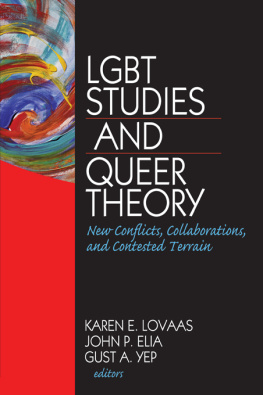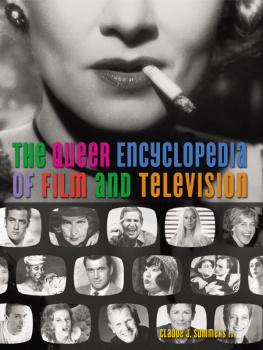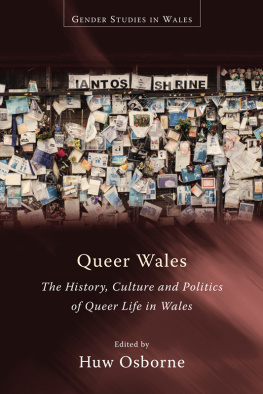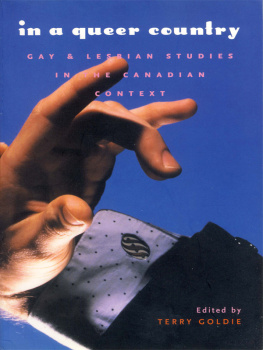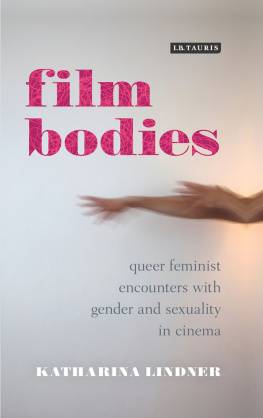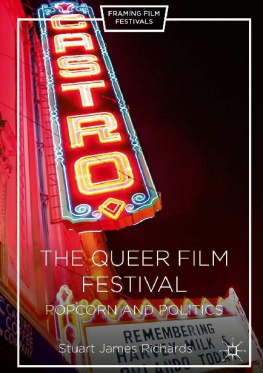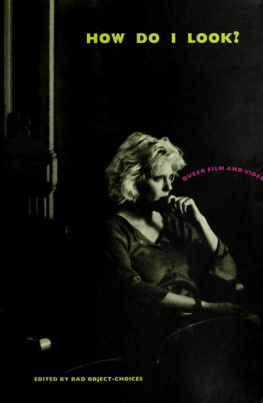CRITICAL QUEER STUDIES
Gender in Law, Culture, and Society
Series Editor
Martha Albertson Fineman, Emory University School of Law, USA
Gender in Law, Culture, and Society will address key issues and theoretical debates related to gender, culture, and the law. its titles will advance understanding of the ways in which a societys cultural and legal approaches to gender intersect, clash, and are reconciled or remain in tension. The series will further examine connections between gender and economic and political systems, as well as various other cultural and societal influences on gender construction and presentation, including social and legal consequences that men and women uniquely or differently encounter. Intended for a scholarly readership as well as for courses, its titles will be a mix of single-authored volumes and collections of original essays that will be both pragmatic and theoretical. It will draw from the perspectives of critical and feminist legal theory, as well as other schools of jurisprudence. Interdisciplinary, and international in scope, the series will offer a range of voices speaking to significant questions arising from the study of law in relation to gender, including the very nature of law itself.
Critical Queer Studies
Law, Film, and Fiction in Contemporary American Culture
CASEY CHARLES
University of Montana, USA
First published 2012 by Ashgate Publishing
Published 2016 by Routledge
2 Park Square, Milton Park, Abingdon, Oxon OX14 4RN
711 Third Avenue, New York, NY 10017, USA
Routledge is an imprint of the Taylor & Francis Group, an informa business
Copyright Casey Charles 2012
Casey Charles has asserted his right under the Copyright, Designs and Patents Act, 1988, to be identified as the author of this work.
All rights reserved. No part of this book may be reprinted or reproduced or utilised in any form or by any electronic, mechanical, or other means, now known or hereafter invented, including photocopying and recording, or in any information storage or retrieval system, without permission in writing from the publishers.
Notice:
Product or corporate names may be trademarks or registered trademarks, and are used only for identification and explanation without intent to infringe.
British Library Cataloguing in Publication Data
Charles, Casey, 1951-
Critical queer studies : law, film, and fiction in
contemporary American culture. -- (Gender in law, culture,
and society)
1. Sexual minorities--Crimes against--United States--
Case studies. 2. Sexual minorities--Legal status, laws,
etc.--United States. 3. Culture and law. 4. Legal films--
United States--History and criticism. 5. Homosexuality and
motion pictures--United States. 6. Gays in motion
pictures--Case studies. 7. Trials in motion pictures--
Case studies. 8. Milk, Harvey--Assassination. 9. White,
Dan, 1946-1985--Trials, litigation, etc. 10. Van Sant,
Gus. Milk.
I. Title II. Series
340.1150973-dc23
Library of Congress Cataloging-in-Publication Data
Charles, Casey, 1951-
Critical queer studies : law, film, and fiction in contemporary American culture / by Casey Charles.
p. cm.
Includes bibliographical references and index.
ISBN 978-1-4094-4406-0 (hardback) -- ISBN 978-1-3155-7508-7 (ebook) 1. Homophobia--Law
and legislation--United States. 2. Gays--Legal status, laws, etc.--United States. 3. Gay rights--United
States. 4.
Homosexuality--Law and legislation--United States. 5. Hate crimes--United States. 6. Transgender youth--Violence against--United States. I. Title.
KF4754.5.C43 2012
346.73013--dc23
2012001684
ISBN: 978-1-4094-4406-0 (hbk)
ISBN: 978-1-3155-7508-7 (ebk-PDF)
ISBN: 978-1-3171-5708-3 (ebk-ePUB)
List of Figures
Table of Cases
Batson v. Kentucky 476 U.S. 79, 106 S.Ct. 1712 (United States Supreme Court, 1986).
Brandon v. County of Richardson 252 Neb. 839, 566 N.W.2d 776 (Supreme Court of Nebraska, 1997).
Brandon v. County of Richardson 261 Neb. 636 at 646647 (2001).
Bush v. Gore 531 U.S. 98 (United States Supreme Court, 2000).
Goodrich v. Dept. of Public Health, 798 N.E.2d 941 (Supreme Judicial Court of Massachusetts, 2003).
In re Marriages, 189 P.3rd 459 (California Supreme Court, 2008).
Lawrence v. Texas, 539 U.S. 558 (United States Supreme Court, 2003).
People v. Garcia, 77 Cal.App.4th 1269, 92 Cal.Rptr. 339 (California Court of Appeals, 2000).
People v. Rodriguez, 256 Cal. App. 663, 64 Cal. Rptr. 253 (California Court of Appeals, 1967).
People v. Wheeler 22 Cal.3rd 258, 583 P.2d 748 (California Supreme Court, 1978).
Perry v. Schwarzenegger 704 F.Supp. 2d 921 (United State District Court for the Northern District of California, 2010).
Romer v. Evans, 517 U.S. 620, 644 (United States Supreme Court, 1996).
Rowland v. Mad River Local School District, 470 U.S. 1009, 1014, 105 S.Ct. 1373 (United States Supreme Court, 1985).
State of Nebraska v. Lotter 255 Neb. 456, 586 NW.25 591 (Nebraska Supreme Court 1998).
State of Nebraska v. Nissen 252 Neb. 51, 560 N.W.2d 157 (Nebraska Supreme Court, 1997).
Strauss v. Horton 46 Cal.4th 364; 93 Cal.Rptr. 951, 207 P.3d 48 (California Supreme Court, 2009).
Introduction
In the introduction to a recent issue of South Atlantic Quarterly on Writing since Queer Theory, the editors lament a lack of contributions from scholars working in film and legal studies. This book seeks to fill that gap by examining recent American films and documentaries that dramatize the intersection of law and queer life. Critical Queer Studies focuses on the way contemporary film and fiction integrate and influence crucial issues of queer law, including jury selection, unwanted sexual advance, negligence, hate crimes, and gay marriage. Works like Milk, Brokeback Mountain, Boys Dont Cry, The Laramie Project, and Howl have become barometers of the changing face of queer law in our country; their production and reception participate, I will argue, in a world of discourse that necessarily interacts with legal pronouncements through processes of articulation, citation, and commemoration. Film renditions of the stories of Harvey Milk, Brandon Teena, Matthew Shepard, and Ennis del Mar re-enact, to borrow Victor Turners formulation, dramas of social conflict that participate, critique, and even foment legal doctrine, illuminating the reciprocity between legal and cultural representation and demonstrating how the law maintains its hold over the queer subject through a series of ideological fictions, and conversely, how these works of film, drama, and fiction draw upon the realities of queer legal status to dramatize their narratives.
Critical Queer Studies finds its bearings at the intersection of two discrete paths of critical inquiryqueer studies and law and literature. Within these parameters, I engage questions of film adaptation and archival citation, drawing for example in the Harvey Milk chapters on a compilation of documentary (Epsteins


